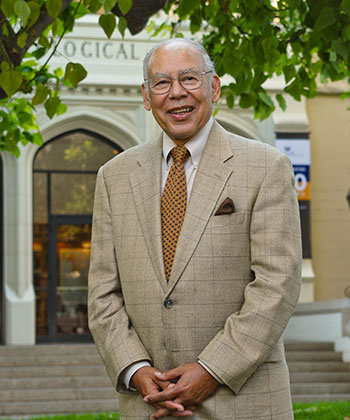 Dr. Stacey Floyd-Thomas
Dr. Stacey Floyd-ThomasBy Neil Earle
 Dr. Stacey Floyd-Thomas
Dr. Stacey Floyd-ThomasIt wouldn’t be Martin Luther King, Jr. time of year without Fuller Theological Seminary in Pasadena, CA doing “something special.”
The Celebration Schedule this year was kicked off by a chapel service featuring Dr. Stacey M. Floyd-Thomas, a professor of ethics and society at Vanderbilt University. In her compressed but forceful 35 minute talk on January 20, Dr. Floyd-Thomas showed herself a master of expository teaching. She jumped off from the encounter between Jesus and the Canaanite woman in Matthew 15:21-28. From this encounter she wove together themes of persistence in the racial struggle, audacious faith in the face of sometimes discouraging realities and an encouragement for the black community and their allies to persevere in a style worthy of the legacy Dr. King advanced in his day.
With her gift of excavating underlying Scriptural realities, Dr. Floyd-Jones showed how the Canaanite woman “floored Jesus” with her answer to his provocative rebuff. “She was one of those women who helped shape Jesus’ plans.” When she had reached out for Jesus to heal her daughter from demon possession he gave the startling answer: “It is not right to take the children’s meat and give it to dogs.”
 Fuller is the base of Bill Pannell, one of the respected leaders among black evangelicals whom Neil Earle and Curtis May met last month.
Fuller is the base of Bill Pannell, one of the respected leaders among black evangelicals whom Neil Earle and Curtis May met last month.In her clear and entertaining exegesis of the passage Professor Floyd-Thomas showed how Jesus answer fitted the stereotypes of his day. Matthew’s account is the only one to mention a Canaanite in the entire New Testament. Canaanites in the Old Testament were the worst of the outsiders, “the enemies of Israel, the enemies of God.” “Dog” was a common term for them among the exclusivist Jews of the day and “no Biblical commentary can clean up the force of this moniker.” The scholars in the audience agreed.
But the woman would not be turned away, neither by the words of Jesus nor the disciples’ rough response.
Her answer reverberated: “True, Lord but even the dogs get to eat the crumbs from the table.”
That did it. She appealed through the human Jesus to the divine Jesus and she won out by a rugged and tenacious display of faith. “Let it be to you as you desire,” Jesus replied and her daughter was healed instantly.
“She wouldn’t stop,” Professor Jones summarized,”and neither should we.”
Three thing are needed, three takeaways from the lesson.
First said Dr. Floyd-Jones, we need fresh and renewed perspectives. Fear and humiliation could not deter this woman from her goal. Unarmed black killings and a “from school to prison” justice system must not deter us today. She cited an MLK talk to the Montgomery Improvement Association during that famous bus boycott in 1955. Dr. King was adamant: we must not be dissuaded by the state of Montgomery because “the Supreme Court is with us, the Constitution is with us” and it is not wrong to demand equal treatment through a tactic of non-violence. Legal redress, through legal means, was Dr. King’s mantra. If change is not possible, he added, then Jesus was just a utopian dreamer.
 Curtis May
Curtis MaySecond, an unrelenting sense of purpose. King’s strategy was rooted in practicality. Before a Western Michigan University audience in 1963 he answered objections to those who argued “you can’t change the heart through legislation.” This is only a half-truth said Dr. King. “It may be true that the law cannot change the heart but it can restrain the heartless. It may be true that the law cannot make a man love me but it can keep him from lynching me and I think that is pretty improvement.” Dr. King knew that legislation can make a difference. “Faith calls society to account,” added Dr. Floyd-Jones. “Just as the Canaanite woman pressed her case so must we press ours” through all the remedies available to us. “Legislation cannot change the heart, maybe, but it can at least regulate behavior and that is something.”
Third, we must be persevering. “By her perseverance the Canaanite woman actually evangelized Jesus,” Floyd-Jones boldly asserted. The professor reminded the audience of how the historic black experience moved along sustained by praise and perseverance. “Not the audacity of hope but audacious faith moving us along so we can be made whole.“ Jesus’ own story reminds us of a life lived in the defiance of evil, she reminded us. “Here he was the son of a teenage mother, raised near animals in a manger, an outcast from Nazareth, arrested on trumped up charges, and finally slaughtered as an innocent.”
This was a powerful way to end. It fit her references to the black struggle as a prophetic movement – “our very existence [as a black community] proving the existence of God, not defeated by individual setbacks.”
Hers was a forceful and insightful testimony and a reminder of Thomas Paine’s words during the American Revolution that “hell is not easily conquered.” So let all of us in this unending struggle push on in the spirit of the Canaanite woman who refused to accept the word “No” and pushed on to receive the Lord’s ‘Yes.’ On, then, against the demons of our day and age in the power of praise and perseverance.